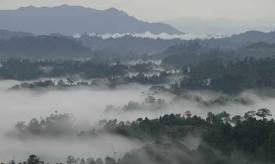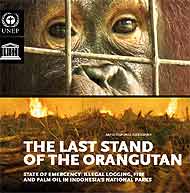JAKARTA POST: Conservation work in Indonesia requires religious essentials
August 5 2008:
 |
 |
 |
"Of course, not everybody will automatically turn into an environmentalist if they understand a little ecology or learn that caring for the environment is a religious duty. However, if environmental conservation is publicly understood to be a religious duty, it will be much easier for conservation workers to do their job." Greenpeace picture. |
This article appeared as an Opinion Editorial Column in the Jakarta Post, August 8, 2008. It is reproduced by kind permission of the author.
By Dr Wiryono, University of Bengkulu
Protecting conservation areas is becoming much more difficult for several reasons:
First, the prices of palm oil and coffee are high and rising, triggering higher demands for land and forest areas to be converted for plantation use (both legally and illegally). Even conservation areas will not be safe.
Second, with the increase of oil and food prices, the number of poor people is increasing. These people will seek any means possible to support themselves and their families and as a consequence, illegal logging will also increase.
 |
 |
 |
UNEP poster condemning illegal logging in Indonesia - and its consequences |
Third, next year Indonesia will have national elections. Conservation workers have noted an increase in cases of illegal logging in the lead up to such elections.
Threats to conservation forests come not just from low-income earners or bad guys in the business world, but also from local governments and even local forestry offices. Until now conservation areas have been under the control of the central government. Local governments usually perceive conservation forests as a hindrance to their economic development.
They wish they could just go in and remove timber from such areas, even though most are located on steep slopes which are unsuitable for agriculture.
Much of Indonesia's conservation problem is more philosophical than technical. When conservation areas were established, in many cases the decision was not based on popular consensus but from a top down process. Many conservation areas were established during the colonial era and then expanded and were reestablished during the New Order regime. Local people were not consulted before the establishment of these places. Many tribes have even claimed that their rights to their ancestral land has been denied with the establishment of these areas.
The absence of communication between conservation authorities, local people and local governments prior to conservation areas' establishment has had disastrous effects. Most laymen in Indonesia do not fully appreciate the value of conservation areas in this country.
Some perceive conservation issues are made by western countries in their own interests. For most Indonesians, including those in the government, it doesn't make sense to have vast areas of protected forest without being able to exploit them for timber.
According to the religion adhered to by most Indonesians (Islam), everything in nature was created for the benefit of mankind. Leaving vast areas of forest untouched seems like wasting this "resource". Trying to convince these people that wildlife has the same right as humans do -- to live peacefully on earth -- may be futile. For farmers near forests, rare animals like elephants are enemies which often destroy their crops. Large carnivores like tigers are a threat to their safety.
A utilitarian approach is more a more effective means to promote conservation in Indonesia. We conserve natural forests not for the sake of wildlife, but for the benefit of the human race in the long run. We must explain the function of forest ecosystems as a life support system. If we destroy them, we will destroy ourselves. And the impact of deforestation on global warming is also very clear.
Adopting an anthropocentric approach -- as opposed to ecocentric -- is not necessarily bad for conservation, as long as we keep a balance between short-term and long-term interests. In the shorter-term, clearing mangrove forests for real estate may be profitable, but in the long run we may have to pay a higher price for environmental problems this may cause like flooding and abrasion.
Wild plant species which currently have no economic value may someday save human beings from incurable diseases. Wild plant species, usually more resistant, could also save us should an outbreak of pests destroy all our crops. Conserving wild plant species is therefore essential for the future survival of the human race.
Ecology, the study of the interrelationship between organisms and their environment, should be taught from an elementary school level. To implement ecology into practice we need a national movement. Thus far, the environmental movement in Indonesia has been the domain of a few dedicated activists, mostly nature lovers, from big cities.
Recently, celebrities have also been getting involved in green campaigns. This is good, but we need to instill environmental awareness in a broader scope of the population.
Religious preachers need to get involved. Every morning, almost all TV stations have religious programs. Every Friday most Indonesian males go to Mosques to listen to sermons. During the month of Ramadhan, religious programs are intensified via TV, radio and in mosques. Environmental campaigns should be included in religious teaching.
While the Koran explicitly says nature was created for the benefit of man, it also says explicitly that man is not allowed to harm the earth. Even during wars, armies of Islam must not harm animals, destroy crops or cut down trees.
As the vicegerent of God on earth, man should manage the earth wisely for the benefit of all people -- not just the current generation, but also for future generations. Caring for the earth is an individual duty for every Muslim. A Muslim will be rewarded for doing so, and will be punished for neglecting this duty.
Would the environment be protected better if environmental campaigns were grounded in religious teaching? Indonesians are well known to live hypocritical lives. Our religion forbids us from stealing and lying, but corruption is pervasive even among those who have made the pilgrimage to Mecca.
Of course, not everybody will automatically turn into an environmentalist if they understand a little ecology or learn that caring for the environment is a religious duty. However, if environmental conservation is publicly understood to be a religious duty, it will be much easier for conservation workers to do their job.
Then they would have not only a legal foundation, but also a religious framework to work in. Local people and government officials would no longer perceive the conservation movement as western values being imposed upon them.
The writer is Head of Forestry at the Faculty of Agriculture, Bengkulu University. He can be reached at wiryonogood@yahoo.com
|

